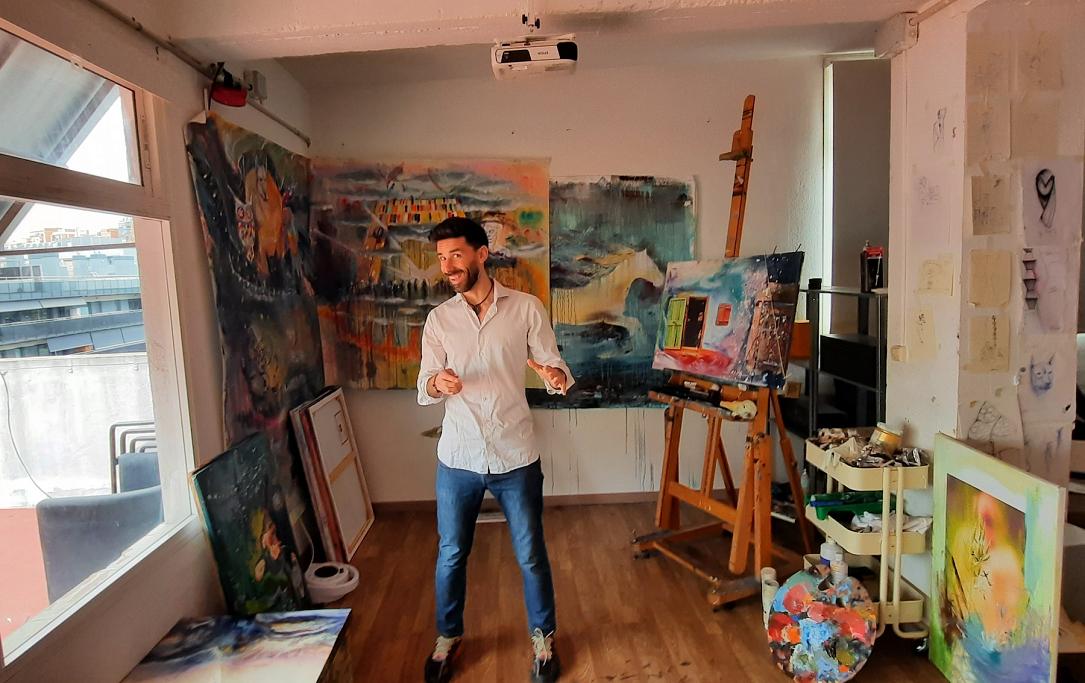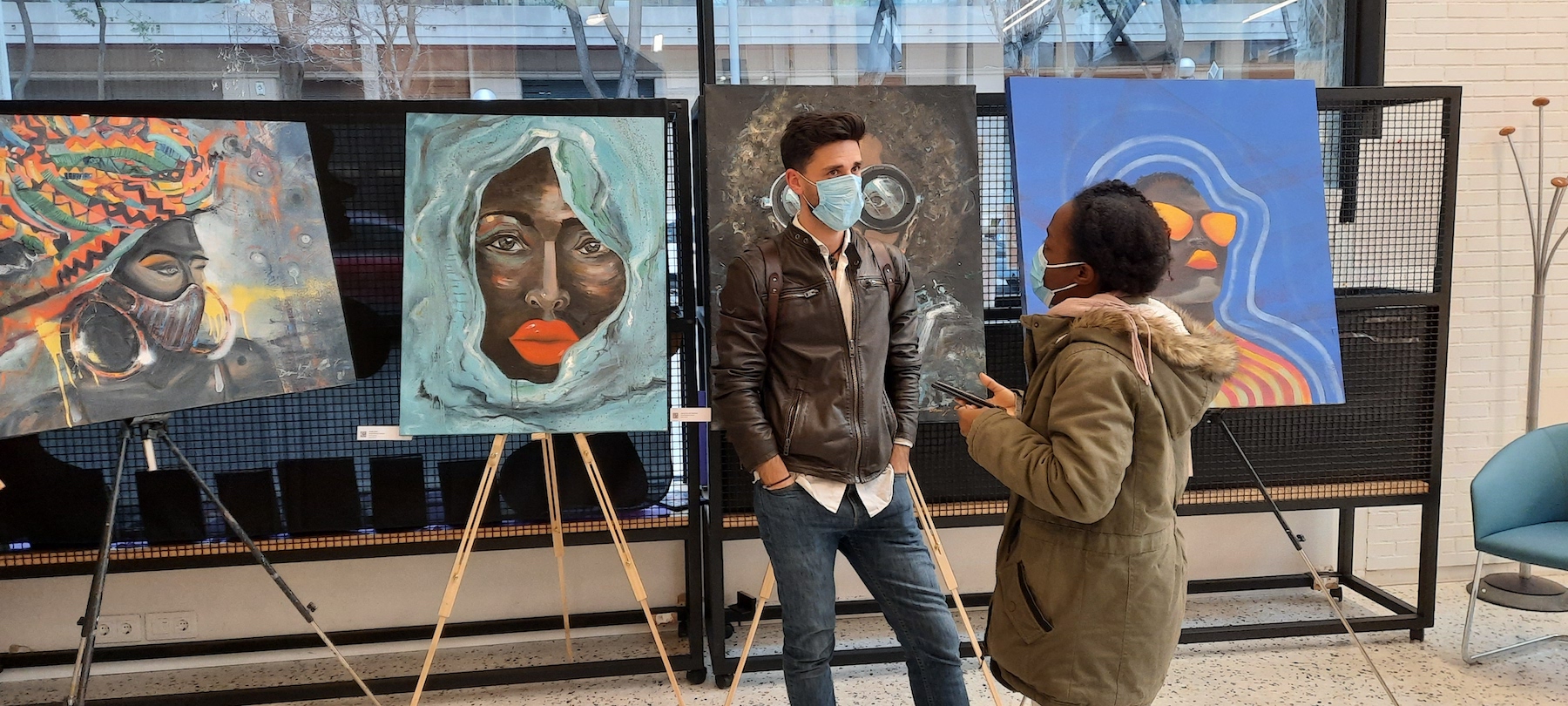Painting with beetroot, or where does an ambitious Romanian artist stand in today’s value crisis



You can read this exclusive article and support us to write more such interviews by getting a Romania Insider membership. With our Premium membership, you will access all our exclusive articles and also get seven premium newsletters.
Far away from the most common attractions visited by Barcelona’s 27 million yearly tourists, lies the quiet, yet lively neighbourhood of Les Corts. In a corner of the local library, you can find Daniel Zlota’s latest collection, one that celebrates women, promotes freedom, and strikes diversity.
Given the context, Daniel is speaking quietly, presenting the motivation behind his paintings to the people that joined on the last day of his exhibition: “We tend to give people labels because of history and prejudices, but if we do not speak out for those issues, they will be left behind, unresolved,” says Daniel one day before leaving for New York and Cancún, for business and a well-deserved holiday.

Daniel was born in Focșani in 1985, four years before the Romanian Revolution. Since he was a little kid, he was always interested in the novel and progression. He chose to study at the local arts high school because he “found it interesting. It was only the third year they organised classes for the 5th grade, and I wanted to be there, surrounded by Nirvana and leather jackets,” he remembers.
Later, Daniel chose to study architecture in Bucharest because he found joy in the structure and logical thinking this type of art provided him. During his years in the capital city of Romania, being surrounded by both business executives as well as university dropouts, he found that his principles do not align with the “I have a friend who can help you” mentality. “My work is a projection of my values. For me it's important that my clients, and, in general people who appreciate my art, share the same values,” Daniel says.
In Romania, throughout history, values have had plenty of reasons to change. That might explain the trust paradox found by the ISRA National Study in 2018, when 81% of Romanians answered that they keep their word, 71% declared themselves as being honest, but 63% said that it’s never good to believe what others say. Moreover, the National Atlas of Values mentions that, even after the Revolution, the Romanian society has still been lagging behind in Europe, as one of those that mistrust the most. A common topic covered in both these publications is that Romanians’ most important achievement in life is building a family, even though, they have one of the lowest frequencies in Europe to meet their close friends.
Surrounded by this confusing environment, Daniel was one of those who decided to find his fulfilment somewhere else. Three years ago, he decided, together with his wife, that they did not want to raise their newborn daughter in Bucharest. “When you do not have a child, you don’t care about the extremely tall road curbs, or the fact that you cannot pass with the baby stroller past the one, or ten cars, parked on the pathway,” he says, with a sarcastic grin on his face.
So, without second thoughts, he and his family followed a dream that first occurred in 2010 and finally moved to Gaudi’s city. Daniel now finds it unbelievable to live in Barcelona, “because I am one of those people who walk on the streets for hours, and could just stare at the wrought-iron balconies, Batllo House, or Sagrada Familia.”
Back in Bucharest, Daniel had several interior design projects and art exhibitions, where he explored various Romanian traditions, displayed his work in the National Theatre, and worked with top Romanian photographers. However, his motivations had a slight change during the COVID pandemic, partly because of lockdowns’ limitations, but mainly thanks to the time he spent painting with Eva, his daughter. That is how he established Bio Art, a project where his paintings are created sustainably, where brushes are made of pony hair and the paint comes from coffee, beetroot, or turmeric. During his time with Eva, Daniel also decided to focus his attention more on the community. He initiated a project that allows visually impaired people to interact with visual arts through touching, and he started investing more time into volunteering.
Initially, he spoke during Teach for Romania courses. “They asked me if I could help by talking to children from disadvantaged backgrounds, but I was in Barcelona. As soon as they told me it was all online, I didn’t hesitate,” Daniel remembers. While in Catalonia, he also found out about GRASP, an international NGO that helps young Romanian professionals to connect and create a network in their cities. “I was a speaker during a GRASP event, talking about my Mexican collection, and I was impressed to see how many Romanians attended it, but more importantly, they were all very cool!”, he notes.
GRASP’s values are dedicated to inspiring and empowering its members to help drive positive change in Romania. Andreea Oprescu is one of the local hosts from GRASP Barcelona and described the NGO as a community: “Our goal cannot be achieved without the people who come to our events, who invest their time, who put their energy into inspiring others through their own personal or professional stories”, she says. GRASP’s hubs are called chapters, and Andreea explains how she and her husband created Barcelona’s chapter for a shared interest in hearing more than just the common chats between Romanians: “We have lived in London before, and we saw that through GRASP, Romanians could gather around for discussing ideas and encourage change, and not just sharing traditional food and drinking palinka.”
In the National Atlas of Values (NAV) the interests in promoting community values and trusting others, seen in highly skilled Romanian immigrants, are both higher than for Romanians living in Romania. The same report includes several pages talking about the strong mistrust and lack of tolerance Romanians show in their relationships with others than their families. One of their studies displays that, in Romania, half the population would disagree with having a gay or Roma neighbour, numbers overtaken only by alcoholics and drug addicts.
“I want to believe that my work is also valuable for others, not just for me, mainly because I want to inspire honesty. Nowadays, in our societies, one may say that <<we are diverse, we are equal, or we are against racism>>. However, I don’t always believe that what we tell, is, ultimately, the truth,” Daniel says.
Back in his workshop in Les Corts, Daniel carefully checks his work, stopping next to an older painting that shows a Romanian countryman, looking from his door frame to a handful of grey cranes covered in barbed wire. Not painted barbed wire, but real, sticking out of the painting in tangible defiance. “As this man looks to the past, I think we should do the same and be aware of our roots. What we do with this awareness is crucial, because, if we, as professionals, do not talk about the problems in our society, then we sweep them under the rug, and automatically, lie to ourselves,” he concludes.
by Stefan Paiu, features writer
Stefan has had a rather radical career change in recent years, shifting from computer science to journalism. His goal is to bring out people's stories, with a focus on social injustice, environmental protection and sports.
(Photos by Stefan Paiu)